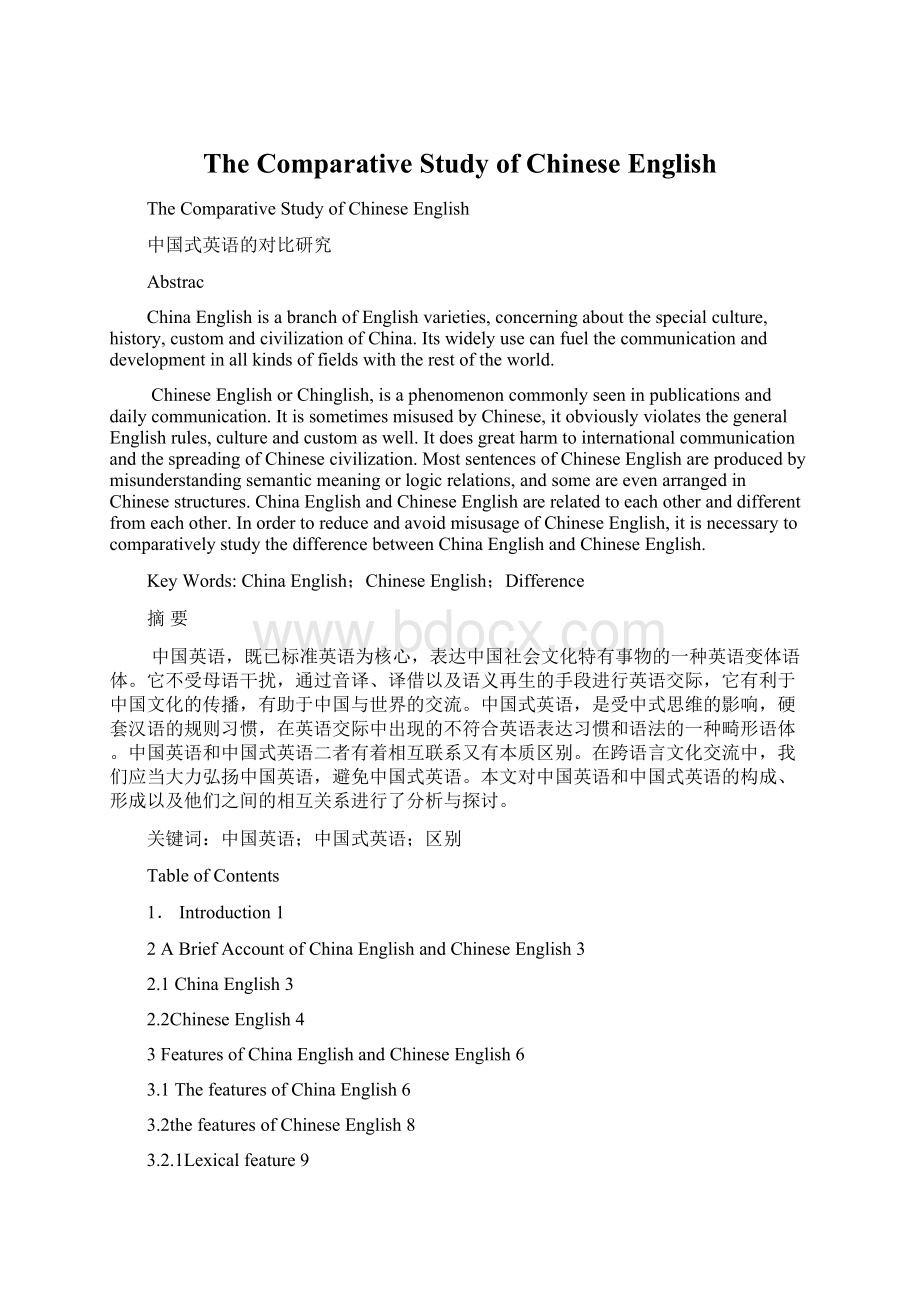The Comparative Study of Chinese English.docx
《The Comparative Study of Chinese English.docx》由会员分享,可在线阅读,更多相关《The Comparative Study of Chinese English.docx(14页珍藏版)》请在冰豆网上搜索。

TheComparativeStudyofChineseEnglish
TheComparativeStudyofChineseEnglish
中国式英语的对比研究
Abstrac
ChinaEnglishisabranchofEnglishvarieties,concerningaboutthespecialculture,history,customandcivilizationofChina.Itswidelyusecanfuelthecommunicationanddevelopmentinallkindsoffieldswiththerestoftheworld.
ChineseEnglishorChinglish,isaphenomenoncommonlyseeninpublicationsanddailycommunication.ItissometimesmisusedbyChinese,itobviouslyviolatesthegeneralEnglishrules,cultureandcustomaswell.ItdoesgreatharmtointernationalcommunicationandthespreadingofChinesecivilization.MostsentencesofChineseEnglishareproducedbymisunderstandingsemanticmeaningorlogicrelations,andsomeareevenarrangedinChinesestructures.ChinaEnglishandChineseEnglisharerelatedtoeachotheranddifferentfromeachother.InordertoreduceandavoidmisusageofChineseEnglish,itisnecessarytocomparativelystudythedifferencebetweenChinaEnglishandChineseEnglish.
KeyWords:
ChinaEnglish;ChineseEnglish;Difference
摘要
中国英语,既已标准英语为核心,表达中国社会文化特有事物的一种英语变体语体。
它不受母语干扰,通过音译、译借以及语义再生的手段进行英语交际,它有利于中国文化的传播,有助于中国与世界的交流。
中国式英语,是受中式思维的影响,硬套汉语的规则习惯,在英语交际中出现的不符合英语表达习惯和语法的一种畸形语体。
中国英语和中国式英语二者有着相互联系又有本质区别。
在跨语言文化交流中,我们应当大力弘扬中国英语,避免中国式英语。
本文对中国英语和中国式英语的构成、形成以及他们之间的相互关系进行了分析与探讨。
关键词:
中国英语;中国式英语;区别
TableofContents
1.Introduction1
2ABriefAccountofChinaEnglishandChineseEnglish3
2.1ChinaEnglish3
2.2ChineseEnglish4
3FeaturesofChinaEnglishandChineseEnglish6
3.1ThefeaturesofChinaEnglish6
3.2thefeaturesofChineseEnglish8
3.2.1Lexicalfeature9
3.2.2Syntacticfeatures9
3.2.3Discoursefeatures9
3.3TherelationshipbetweenChinaEnglishandChineseEnglish10
4TheriseofChinaEnglishandChineseEnglish12
5AcceptingChinaEnglish,notChineseEnglish13
5.1AboutChinaEnglish13
5.2AboutChineseEnglish14
5.3AcceptingChinaEnglish,notChineseEnglish15
6AchievementsofChinaEnglish16
6.1Communication16
6.2Tranlation16
7Conclusion17
References18
Acknowledgements19
1.Introduction
Withthedevelopmentofglobalization,Englishhasreachedtothewholeworldandbecometheinternationallanguage.Inrecentyears,thenumberofChinesepeoplewholearnEnglishhasreached250million.ThismeansthatmanynewwordsarecreatedbyChineseeveryday.Whereas,inChina,thediscussionbetweenChinaEnglishandChineseEnglishisstillexistedandcatchlotsofattentions.
EnglishglobalizationhasactuallytriggedthelocalizationofEnglishlanguage,becauseeachnationpossessesdifferenthistory,culture,politicalenvironmentetc.So,English,asatoolforinternationalcommunication,sdoomedtobebrandedwithdifferentnationalcolours.ThewideuseofEnglishamongnon-nativeandnativespeakersinadiverserangeofsocialandculturalcontextswillinevitablyproduceregionalvarieties.
ThelanguagecontactofEnglishandChinesecanbetracedbacktothe17thcentury,andsincethenEnglishlanguagehasbeenexperiencingalongprocessoflocalizationinChinesecontext.However,itwasnotuntil1982thatthetermChinaEnglishwasfirstproposedbyGeChuangui,awellknownChineselexicographer.ChinaownsthelargestEnglishlearninggroupintheworld.Therearemorethan300millionEnglishlearnersinChina,whichoccupyonefourthofthetotalpopulationinthecountry.AndsomeexpertsintheSecondInternationalConferenceonForeignLanguageTeachingMethodologyatShanghaiInternationalStudiesUniversityrevealthattotalnumberofEnglishlearnersinChinawillexceedthewholepopulationofEnglishspeakingcountriesinthenearfuture.Thisstudywasconductedin2005.Asweallknow,languageusedbyalargeamountofpeoplemayholdmoreinfluence.Therefore,itisofrealisticvaluetostudyChinaEnglishandChineseEnglish.
AndChinesehasbeenmakingcontributiontothedevelopmentofStandardEnglish.Inrecent,GlobalLanguageMonitoringInstituterevealsthatEnglishhasbeenexperiencingtheunprecedentedreforminthehistorybecauseofChinglishshock.AlotofChinesewordspermeateintoEnglishvocabulary,becomingthemajorresourceofEnglishvocabulary.Tosomeextent,Englishturnsintoaworldpidgin.AccordingtothestatisticsoftheinstituteinFebruary2007,ChinaEnglishhasdevoted5%-20%,surpassinganyotherresourcetoenlargeEnglishvocabularysince1994.Thesewordsandphraseareallunderstandableforthenativespeakerswithoutanyspecificexplanation.
Now,ChinaEnglishiswidelyacceptedanddistinguishedfromthedeformedChineseEnglish.Undertheinfluenceofglobalization,weChineseneedtoexpresswhatisuniqueinChinaininterculturalcommunication.WhatisuniqueinChinaortypicaloftheChineseculturehasmadeitnecessarytouseChinaEnglishtoexpressChineseideasaspartofone'scommunicativecompetence.Thus,acomprehensivestudyofChinaEnglishisgreatlyvaluedinlanguagetheoryandincommunicativepracticeaswell.However,manyEnglishlearnersareveryeagertospeaklikeanative,regardingChinaEnglishascontortedlanguage,whichsometimesisconnectedwithlowracialandsocialstatus.Hence,theytotallyignoredifferentfeaturesofChinaandChineseculture.ItisevidentthatbesidesEnglishinEnglandandEnglishinAmerica,thereisCanadianEnglish,AustralianEnglish,NewZealandEnglish,IndianEnglish,SingaporeEnglishandsoon.AndsodoesEnglishinChina.However,presently,ChineseEnglishandChinaEnglisharegettingmoreandmoreattentionintheworld.
Tillnow,asarisingphenomenon,ChinaEnglishisfacingalotofproblems.OneistherelationsamongstandardEnglish,ChinaEnglishandChineseEnglish.AnotheriswhatattitudeweshouldhavetowardChinaEnglishandChineseEnglish.ThisthesiswillmakeitclearthatpeopleshouldadmitChinaEnglishasanessentialpartoftheEnglishlanguage.
2ABriefAccountofChinaEnglishandChineseEnglish
2.1ChinaEnglish
What'sChinaEnglish?
GeChuangui(1980)isthefirstscholarwhocomesupwiththeterm"ChinaEnglish".Hepointsout:
"Everycountryhasitsownsituation.AsforourChina,beitoldornewone,ithasmanythingswithChinesecharacteristicsthatneedtobeexpressedwhentheyarespokenorwritteninEnglish"Andhecitessomeexamplestosupporthisideas:
Hanlinyuan(翰林院)、MayFourthMovement(五四运动)、eight-leggedessay(八股文)、Baihuawen(白话文)、fourmodernization(四个现代化)andsoon.
WangRongpei(1991)holdsthatthedefinitionofChinaEnglish,whichwasinhisarticleTheObjectiveExistenceofChinaEnglish,shouldincludethefollowingthreeparts:
1)ChinaEnglishisusedbyChinesepeopleinChinesenativeland;2)ChinaEnglishshouldhavetheStandardEnglishasitscore;3)ChinaEnglishhasitsuniquefeatures.
LiWenzhong(1993)challengesWangRongpei'sdefinitionofChinaEnglishbypublishinghisarticleChinaEnglishandChineseEnglish.HereLi'sargumentsaboutthepointthattheuseofChinaEnglishisnotrestrictedtoChinesenativeland.ManyEnglishwordsfromChinesehaveenteredEnglishbymeansoftransliterationandloantranslation,suchastea(茶),kowtow(叩头),GreatLeapForward(大跃进),GangofFour(四人帮)andsoon.AlltheseEnglishwordsorphrase,betheyusedinChinaorabroad,areChinaEnglish.Hethinksthatevensuchexpressionsas"LittleRedBook"and"CommunistChina"mightbeconsideredasChinaEnglish,whicharecoinedbythewesternersandareneverusedinthenativelandofChina.
Aboveall,thedefinitionsofChinaEnglishhaveaconcentrationonthefollowingpoints:
ThefirstiswhetherChinaEnglishhastheinterferencefromChinese.Asiswellknow,therelationbetweenlanguageandthoughtisofdialecticalunity.Languagedevelopmentscanpromotethatofthought,andviceverse.ChinaEnglishdoesnotexistwithoutChineseinterference.Whenone'sEnglishproficiencyisimproved,one'sChineseinterferencemaybeless,butitcanneverdisappearcompletely.ThisisevensoforanexpertinEnglish.SolongasonehasChineseasone'snativelanguageandthinksinChineseway,one'sEnglishisdefinitelycharacteristicofChineseflavor.XieZhijun(1995)oncelakesacontrastbetweenthetwoEnglishversionsofaveryfamousChinesenovelADreamofRedMansionstranslatedbyMr.YangXianyiandhiswife,andbyD.HawkesandJohnMinfordrespectively;hefindsthatthereareanycasesaboutChinaEnglishinYang'sversion,forexampletherearealotofshortsentencepatternsandlessrelativewords.
Thesecondisaboutthe"standardEnglish".The"standardEnglish"doesnotexist.NeitherBritishnorAmericanoneisregardedasa"standard"English,buteachofthemasanEnglishvariety.We,however,mayrefertosuchEnglishasBritishEnglish,AmericanEnglish,AustralianEnglishandSingaporeEnglishas"normative"EnglishwhichconformtothegeneralrulesofEnglishlanguagesandcanbeunderstoodbythenativeEnglishspeakers.
ThethirdconcernsthescopeofChinaEnglish,thatis,whetherithasbeenuseinnativeChineseland.ModernsociolinguistsdivideEnglishvarietiesintotwokinds------internationalandinternationalintermsoftheirpurposeandfunction(SunLi1989).ThisdivisionclearlyindicatesthatanyEnglishvarietycanbeusedbeyondisnativelandandenterinternationaluse.ChinaEnglishismainlyaninternationalvariety.WetakeChineseborrowingsforinstance.Fromtheseventeenthtotwentiethcentury,manyChineseborrowingsdirectlyenteredEnglishthroughtransliterationsuchyamen(衙门),GreatCulturalRevolution(文化大革命),FourModernizations(四个大跃进)andsoon.AlltheseEnglishversionsofcoursebelongtoChinaEnglishnomatterwheretheyareused.
ThefourthisonthescopeofthefeaturesofChinaEnglish,thatis,wheth